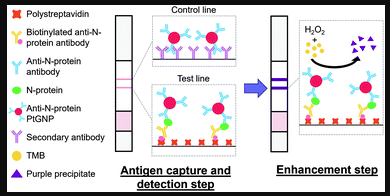Nov 22, 2021
The laboratories of Professors Daniel Kamei and Benjamin Wu recently published an article summarizing their development of an innovative point-of-care device for detecting COVID-19 in undiluted serum. In their research, they developed a nanozyme signal enhanced LFA for the improved detection of the N-protein of SARS-CoV-2 in serum. An innovative 3D printable casing was designed, which stored all assay components including the LFA test strip, dehydrated signal enhancement reagents, and a sealed chamber with stored liquid enhancement buffer. Our paper-based device was able to detect N-protein in undiluted serum in 40 min at concentrations as low as 0.1 ng mL−1, which was at least a 10-fold improvement over the conventional LFA. Moreover, with this all-in-one device, only one simple step of pushing a single button is needed for the signal enhancement to occur after the LFA detection step. The development of devices that have the ability to detect for SARS-CoV-2 antigen biomarkers with improved sensitivity, while maintaining a user-friendly design and scalable manufacturing, is vital to increasing the frequency in screening asymptomatic individuals. This has the potential to significantly improve the response to the COVID-19 pandemic by effectively detecting patients at their early stages of infection and allowing for effective treatment and quarantining procedures to be implemented.

